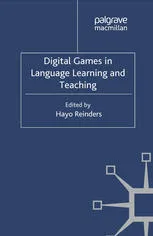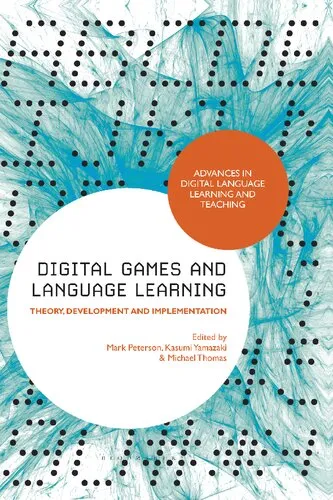Digital Games in Language Learning and Teaching
4.0
Reviews from our users

You Can Ask your questions from this book's AI after Login
Each download or ask from book AI costs 2 points. To earn more free points, please visit the Points Guide Page and complete some valuable actions.Related Refrences:
Introduction to 'Digital Games in Language Learning and Teaching'
The integration of digital games into education has sparked innovative and engaging learning opportunities in various disciplines, particularly in language learning and teaching. My book, 'Digital Games in Language Learning and Teaching', delves into this exciting intersection of technology, pedagogy, and language acquisition, presenting a diverse landscape of theoretical insights, practical applications, and research findings. Designed for educators, researchers, and game enthusiasts alike, this volume explores how digital gaming can foster meaningful language learning experiences, while addressing challenges and best practices for implementation.
Detailed Summary of the Book
This book is a compilation of expert perspectives and research that examines how digital games can contribute to language learning and teaching. The text begins by establishing the foundation of games as instructional tools and how their interactive nature aligns with principles of second language acquisition (SLA). Building on this framework, it investigates several dimensions, such as task-based learning, learner autonomy, motivation, and identity formation through the use of games.
The chapters are written by an array of leading scholars and practitioners in the field, offering a balanced blend of theory and practice. Case studies highlight how games have been used in real-world classroom scenarios, providing valuable insights into their pedagogical design. The book also discusses the use of massively multiplayer online games (MMORPGs), serious games, and language-focused applications, emphasizing their unique affordances for enabling communication, collaboration, and cultural exchange.
By the end of the book, readers will gain a comprehensive understanding of not only the opportunities but also the challenges involved in integrating digital games into curriculum planning. Ethical considerations, limitations of specific tools, and the future of gamification in language education are thoughtfully explored, ensuring a holistic perspective.
Key Takeaways
- Digital games can boost learner motivation and engagement by making language learning more fun and interactive.
- Games provide authentic language exposure, enabling learners to practice real-world communication skills in a low-stress environment.
- Multiplayer games foster collaborative learning and encourage social interaction that supports language acquisition.
- Digital platforms facilitate personalized, self-paced learning, promoting autonomy and confidence in language use.
- Challenges, such as designing pedagogically sound game-based activities and addressing accessibility issues, must be carefully managed.
Famous Quotes from the Book
“The dynamic nature of digital games forces players to be active participants, reflective thinkers, and collaborative learners—qualities that are all essential for effective language learning.”
“In the realm of language education, games serve as both a mirror and a window: a mirror to reflect one’s progress, and a window to explore meaningful cultural and communicative contexts.”
“The real power of games lies not in their entertainment value alone, but in their ability to create immersive, meaningful experiences that connect learners to language and culture.”
Why This Book Matters
In an increasingly digitalized world, traditional language teaching methods require augmentation to meet the needs of tech-savvy learners. 'Digital Games in Language Learning and Teaching' offers a pioneering perspective by advocating for the innovative use of games as tools for language education. The book bridges the gap between theoretical advancements in SLA and their practical application, empowering educators to transform classrooms into vibrant hubs of interactive learning.
As evidence-based findings demonstrate the benefits of digital games for improving language proficiency, cultural competence, and learner motivation, this work becomes an indispensable resource for language teachers seeking to modernize their practices. Additionally, it opens new pathways for researchers to further explore and refine game-based language pedagogies. Ultimately, this book underscores the immense potential of gamification, making it a must-read in the field of language education.
Free Direct Download
You Can Download this book after Login
Accessing books through legal platforms and public libraries not only supports the rights of authors and publishers but also contributes to the sustainability of reading culture. Before downloading, please take a moment to consider these options.
Find this book on other platforms:
WorldCat helps you find books in libraries worldwide.
See ratings, reviews, and discussions on Goodreads.
Find and buy rare or used books on AbeBooks.
1224
بازدید4.0
امتیاز50
نظر98%
رضایتReviews:
4.0
Based on 0 users review
"کیفیت چاپ عالی بود، خیلی راضیام"








